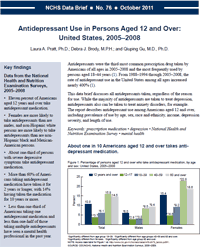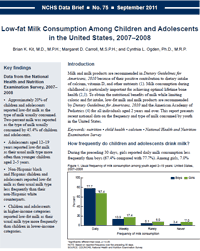
NHANES News
Save the Date for the 2012 National Conference for Health Statistics
The 2012 Conference will be held August 6–8 at the Renaissance Washington DC Downtown Hotel, 999 Ninth Street NW, Washington, DC 20001.
The conference will include a 1-day Learning Institute on August 6, where students will receive hands-on training in accessing and analyzing survey data as well as learning modules on how to use selected data access tools. The Learning Institute will be followed by a 2-day main conference on August 7-8, where attendees will have an opportunity to learn about the latest developments at the National Center for Health Statistics and hear from some of the Nation’s leaders in the fields of health, health data, and statistics.
Please sign up for email updates to ensure that you receive new information as it becomes available.
Over 60 new data files released in September and October: On September 30th, DHANES released over 50 files from the 2009-2010 NHANES survey cycle for public use. This was the second time in history that such a large number of files was released within less than a year after completing the data collection. Included in the public data release were the demographic file, dozens of questionnaire and lab files, and 4 examination files. The Division Director, Cliff Johnson, extended his warm congratulations and special thanks to all staff and collaborators who had a significant role in making this release possible. In October, 6 more public use files, 2 limited access data files and some updates were released to top 60 files released.
National Youth Fitness Survey started national pilot in October. The specially designed 5th trailer has been received, and the national pilot study started data collection in October.
Food Stamp Linkage Study Extended. The Food Stamp Linkage Study has been extended to include additional years of NHANES data. The latest data from 2009-2010 cycle will be added to the earlier years of data (NHANES 2005-2008), and then linked with Supplemental Assistance and Nutrition Program data (formally called Food Stamp Program). A revised and improved linking algorithm will be used for the additional data.
DHANES Staff Recognized
2011 has been an extraordinarily busy and productive year for the Division. Understandably, quite a number of DHANES members were recognized for their special contributions at the NCHS Director’s Staff Awards.
Division Director, Cliff Johnson, received the Owen Thornberry Memorial Award for a career exemplified by dedicated leadership that has inspired staff to achieve beyond what they thought possible in program and personal career goals.
Chia-Yih Wang was recognized in the “Tapped for Excellence” category for her outstanding efforts on a number of critical Division activities.
Brenda Lewis received the Terrence G. Caimotto Memorial Award for her initiative and commitment to continuing high quality laboratory and examination content of the NHANES survey.
The Asian Oversample Group won the NCHS program Mission Award: Lisa Broitman, Yinong Chong, Mark Eberhardt, Anh Nguyen, Tatiana Nwankwo, Ana Terry, Denise Schaar, Sarah Yoon and Te-ching Chen, as well as Kyung Park (from the Office of the Information Services) and Luong Tonthat (of the Division of Health Interview Surveys) received the NCHS Program Mission Award for their collective efforts to produce numerous brochures and materials (translated) for the Asian oversampling effort for NHANES 2011-2014.
NHANES Million Hearts Analysis Group won a Merit Award: Lisa Broitman, Margaret Carroll, Te-Ching Chen, Randy Curtin, Cheryl Fryar, Rosemarie Hirsch, Xianfen Li, and Cynthia Ogden received an NCHS Merit Award for contributing to the Million Hearts Initiative to reduce heart disease by providing complex and innovative estimates from NHANES, with an extremely short turn-around time.
New Branch Chief and Associate Director for Science on Board
Effective August 28, 2011, Dr. Cynthia Ogden became the new Branch Chief for the Analysis Branch, after serving as the Acting Branch Chief for 8 months. Cynthia joined CDC as a member of the Epidemic Intelligence Service (EIS) in 1994. Her research interests relate to nutrition, and in particular, growth and obesity in children. She worked on the revision of the 2000 CDC growth charts for children that are used to define obesity in U.S. children, and has published extensively on both obesity and growth charts. Before joining CDC, she worked in the Nutrition Division at the New York State Department of Health where she researched obesity among school children in New York counties. She has also worked on nutrition related projects for the Food and Agriculture Organization of the United Nations, and teaches a class in nutritional epidemiology at the George Washington School of Public Health. She earned her Ph.D. and Masters degrees from Cornell University where her research focused on malnutrition among young children in Kigali, Rwanda.
Dr. Ryne Paulose-Ram was selected as the DHANES Associate Director for Science effective August 29, 2011. Ryne worked as an epidemiologist in the DHANES Planning Branch from 2000-2007, and since has served as a Director of Comparative Effectiveness, Population Studies and Evidence-Based Strategies, as well as Director of U.S. Health Economics and Outcomes Research for Pfizer Inc. Ryne has a Ph.D. in Behavioral Health and Gerontology, a Master’s Degree in Psychology, and was a licensed laboratory technologist. Her research interests span a broad range of topics such as mental health, asthma, COPD, lower extremity disease, ophthalmology, immuno- and hemato-pathology, pharmaco-epidemiology, and health economics and outcomes research. Ryne has published numerous peer-reviewed journal articles.
Recent Publications Receive Much Media Attention
Two recent publications using NHANES data have received a lot of media attention.
 The first was about antidepressants use in the U.S., authored by Laura Pratt, et al. Antidepressants were the third most common class of prescription drug taken by Americans of all ages in 2005–2008, and the most frequently used by persons aged 18–44 years. From 1988–1994 through 2005–2008, the rate of antidepressant use in the United States among all ages increased nearly 400%. Less than one-third of Americans taking one antidepressant medication and less than one-half of those taking multiple antidepressants have seen a mental health professional in the past year.
The first was about antidepressants use in the U.S., authored by Laura Pratt, et al. Antidepressants were the third most common class of prescription drug taken by Americans of all ages in 2005–2008, and the most frequently used by persons aged 18–44 years. From 1988–1994 through 2005–2008, the rate of antidepressant use in the United States among all ages increased nearly 400%. Less than one-third of Americans taking one antidepressant medication and less than one-half of those taking multiple antidepressants have seen a mental health professional in the past year.
 The second publication was about low-fat milk consumption among children authored by Brian Kit et al. In 2007–2008, only 20.2% of children and adolescents reported consuming low-fat milk as their usual type of milk; low-fat milk consumption was particularly low among non-Hispanic black, Hispanic, and low-income children and adolescents. The overall low consumption of low-fat milk suggests the majority of children and adolescents do not adhere to recommendations by Dietary Guidelines for Americans, 2010 and the American Academy of Pediatrics for all children aged 2 years and over to drink low-fat milk.
The second publication was about low-fat milk consumption among children authored by Brian Kit et al. In 2007–2008, only 20.2% of children and adolescents reported consuming low-fat milk as their usual type of milk; low-fat milk consumption was particularly low among non-Hispanic black, Hispanic, and low-income children and adolescents. The overall low consumption of low-fat milk suggests the majority of children and adolescents do not adhere to recommendations by Dietary Guidelines for Americans, 2010 and the American Academy of Pediatrics for all children aged 2 years and over to drink low-fat milk.